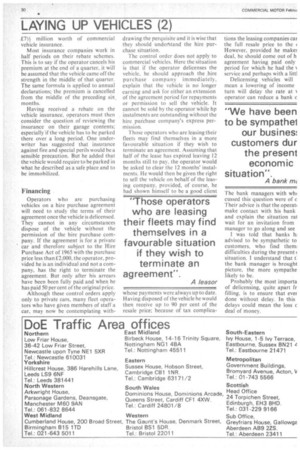LAYING UP VEHICLES (2)
Page 32

If you've noticed an error in this article please click here to report it so we can fix it.
£.71/2 million worth of commercial vehicle insurance.
Most insurance companies work in half periods on their rebate schemes. This is to say if the operator cancels his premium at the end of a quarter, it will be assumed that the vehicle came off the strength in the middle of that quarter. The same formula is applied to annual declarations; the premium is cancelled from the middle of the preceding six months.
Having received a rebate on the vehicle insurance, operators must then consider the question of reviewing the insurance on their garage contents; especially. if the vehicle has to be parked there over a long period. One underwriter has suggested that insurance against fire and special perils would be a sensible precaution. But he added that the vehicle would require to be parked in what he described as a safe place and to be immobilized.
Financing
Operators who are purchasing vehicles on a hire purchase agreement will need to study the terms of their agreement once the vehicle is clelicensed. They cannot in any circumstances dispose of the vehicle without the permission of the hire purchase company. If the agreement is for a private car and therefore subject to the Hire Purchase Act of 1965 with the purchase price less than 2,000, the operator, provided he is an individual and not a company, has the right to terminate the agreement. But only after his arrears have been been fully paid and when he has paid 50 per cent of the original price.
Although these control orders apply only to private cars, many fleet operators who have given members of staff a car, may now be contemplating with drawing the perquisite and it is wise that they should under-stand the hire purchase situation.
The control order does not apply to commercial vehicles. Here the situation is that if the operator delieenses the vehicle, he should approach the hire purchase company immediately, explain that the vehicle is no longer earning and ask for either an extension of the agreement period for repayments or permission to sell the vehicle, It cannot be sold by the operator while hp instalments are outstanding without the hire puichase company's express permission, Those operators who are leasing their fleets may find themselves in a more favourable situation if they wish to terminate an agreement. Assuming that half of the lease has expired leaving 12 months still to pay, the operator would be asked to clear the 12 months' instalments. He would then be given the right to sell the vehicle on behalf of the leasing company, provided, of course, he had shown himself to be a good client whose payments were always up to date. Having disposed of the vehicle he would then receive up to 90 per cent of the resale price; because of tax complica tions the leasing companies cat the full resale price to the However, provided he make.5. deal, he should come out of h agreement having paid only period for which he had the service and perhaps with a littl Delicensing vehicles will mean a lowering of income turn will delay the rate at operator can reduce a bank c
The bank managers with whc cussed this question were of c .[heir advice is that the operati make contact with his bank and explain the situation ral wait for an invitation from manager to go along and see I was told that banks h; advised to be sympathetic to customers, who find them: difficulties during the present situation. I understand that t. the bank manager is brought picture, the more sympathe likely to be.
Probably the most importa of delicensing, quite apart fr filling, is to ensure that ever done without delay. In this delays could mean the loss c deal of money.




























































































